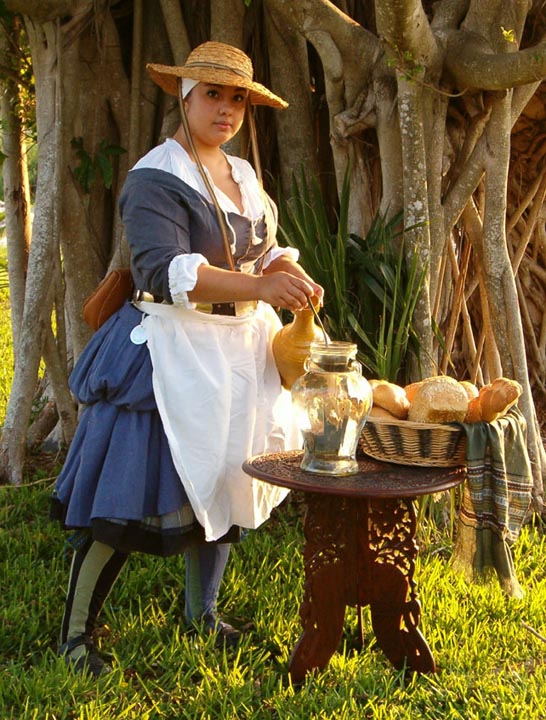Difference between revisions of "Category:German Garb"
| Line 5: | Line 5: | ||
*[[wulsthaube]] A round muffin shaped hat, sometimes having gold embroidery. | *[[wulsthaube]] A round muffin shaped hat, sometimes having gold embroidery. | ||
====16 century==== | ====16 century==== | ||
| + | [[Image:German pesent 16throxanne.jpg.jpeg|thumb|A typical german Peasant's clothing form the 16th century. The lady wears a blue wool [[kirtle]] cut low over her [[Chemise]], which has a collar, and long sleeves. She also wears a straw hat over a [[coif]], striped [[wool]] [[stockings]], and [[turn shoes]]. Her skirts are tied up to avoid soiling them while she works. She also wears a [[white]] [[linen]] apron, marking her as house wife or a house servant. Servants who worked out doors wore dark colored aprons.]] | ||
Typical Styles for Women | Typical Styles for Women | ||
Revision as of 17:20, 13 April 2009
15 century
- Shaube A ladies Jacket
- Hemd Low necked Chemise, usually embroidered long the front.
- Cuspinian Dress
- wulsthaube A round muffin shaped hat, sometimes having gold embroidery.
16 century

Typical Styles for Women
During the 16th century the style of women’s clothing changed dramatically from the relatively unstructured gowns of the Housebook Master to the very tailored structured Spanish influenced styles of the 1570’s.
There are some consistencies throughout the century however:
- Front closing bodices Soft curves over the bust indicating that the bust was supported but not flattened as in Spanish, French and English styles. No gratuitous displays of cleavage however.
- High-necked smocks, with and without ruffs/ruffles
- Flat waistlines, the extreme pointed styles of Spanish, English and French fashion were picked up in the very late 1590’ and only by the upper class.
- Sewn in sleeves
- Bodice and gown are sewn together
- Aprons
- Covered hair. Although towards the middle of the century barrets and hats began to be adopted by women, women always wore something on their heads. Only girls went bareheaded or with a pearled headband on, grown women never did.
Typical layers, from the skin out
- Smock, made of linen
- Corset or bodice
- Petticoat, could be several
- Dress
- Gollar, shoulder cape
- Apron
- Head covering
- Stockings
Typical Styles for Men
Men’s clothing also underwent a serious transformation from the beginning of the century to the end, with the fashion staring out as hose and jerkin, transitioning to Rocks (gowns) and then transitioning to the Spanish influenced styles of doublet, jerkin and breeches. There are a lot more extant examples of men’s clothing from the period than there are of women’s, Janet Arnold’s book Pattern’s of Fashion does a good job of explaining the different types of men’s garments in the second half of the century.
Unlike women’s clothing that just changed the styles of the layers, men’s clothing changed the layers involved completely.
Links
Pages in category "German Garb"
The following 7 pages are in this category, out of 7 total.